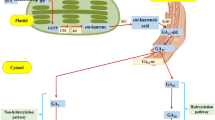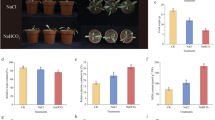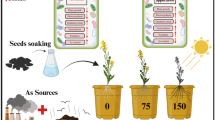Abstract
Chilling stress is one of the limiting factors for late sowing of winter rapeseed (Brassica napus L.) and early sowing of spring rapeseed. Seed priming can effectively alleviate chilling stress during germination, but the potential mechanism with regard to how rapeseed responds to chilling stress is unclear based on metabolomics. Therefore, in this study, seeds were soaked in hydrogen peroxide or water for 8 h. They were then germinated together with untreated seeds under low temperature (8 °C). After priming treatment, liquid chromatography coupled with mass spectrometry was used to investigate the key metabolites and metabolic pathways involved in the germination of rapeseed under low temperature. A total of 6176 metabolites were detected. We summarized 19 different metabolites in response to priming treatment, identified four key differential metabolites (l-γ-glutamylcysteine, l-argininosuccinate, l-glutamate, and glutathione), and established a metabolic pathway centered on glutathione metabolism and amino acid metabolism (including arginine biosynthesis and alanine, aspartate and glutamate metabolism). The results showed that hydrogen peroxide-primed seeds preferentially increased glutathione metabolism after priming, enhanced antioxidant capacity and alleviated chilling stress during germination. An increase in the metabolites involved in cell energy supply and amino acid metabolism was found during germination, resulting in a shorter average germination time and better germination percentage. This experiment revealed the metabolic pathway of the germination of hydrogen peroxide-primed seeds under chilling stress, which provides a theoretical basis for future studies on the chilling resistance of rapeseed.
Access this article
We’re sorry, something doesn't seem to be working properly.
Please try refreshing the page. If that doesn't work, please contact support so we can address the problem.






Similar content being viewed by others
Data availability
The datasets used and/or analyzed during the current study are available from the corresponding author on reasonable request.
References
Abass SM, Mohamed HI (2011) Alleviation of adverse effects of drought stress on common bean (Phaseolus Vulgaris L.) by exogenous application of hydrogen peroxide. Bangladesh J Bot 40:75–83. https://doi.org/10.3329/bjb.v40i1.8001
Abbasi Khalaki M, Moameri M, Asgari Lajayer B, Astatkie T (2020) Influence of nano-priming on seed germination and plant growth of forage and medicinal plants. Plant Growth Regul 93:13–28. https://doi.org/10.1007/s10725-020-00670-9
Acharya P, Jayaprakasha GK, Semper J, Patil BS (2020) 1H Nuclear magnetic resonance and liquid chromatography coupled with mass spectrometry-based metabolomics reveal enhancement of growth-promoting metabolites in onion seedlings treated with green-synthesized nanomaterials. J Agr Food Chem 68:13206–13220. https://doi.org/10.1021/acs.jafc.0c00817
Alseekh S, Bermudez L, de Haro LA, Fernie AR, Carrari F (2018) Crop metabolomics: from diagnostics to assisted breeding. Metabolomics 14:148. https://doi.org/10.1007/s11306-018-1446-5
Ansari MI, Jalil SU, Ansari SA, Hasanuzzaman M (2021) GABA shunt: a key-player in mitigation of ROS during stress. Plant Growth Regul 94:131–149. https://doi.org/10.1007/s10725-021-00710-y
Arruda P, Barreto P (2020) Lysine catabolism through the saccharopine pathway: enzymes and intermediates involved in plant responses to abiotic and biotic stress. Front Plant Sci 11:587. https://doi.org/10.3389/fpls.2020.00587
Arruda P, Neshich IP (2012) Nutritional-rich and stress-tolerant crops by saccharopine pathway manipulation. Food Energy Secur 1:141–147. https://doi.org/10.1002/fes3.9
Carillo P (2018) GABA shunt in durum wheat. Front Plant Sci 9:100. https://doi.org/10.3389/fpls.2018.00100
Choudhury FK, Rivero RM, Blumwald E, Mittler R (2017) Reactive oxygen species, abiotic stress and stress combination. Plant J 90:856–867. https://doi.org/10.1111/tpj.13299
Costa Silva Neta I, de Resende V, Von Pinho E, de Abreu VM, Rezende Vilela D, Santos MC, Oliveira Dos Santos H, Diniz Cabral Ferreira RA, Garcia Von Pinho R, de Castro C, Vasconcellos R (2020) Gene expression and genetic control to cold tolerance during maize seed germination. BMC Plant Biol 20:188. https://doi.org/10.1186/s12870-020-02387-3
Couto N, Wood J, Barber J (2016) The role of glutathione reductase and related enzymes on cellular redox homoeostasis network. Free Radic Biol Med 95:27–42. https://doi.org/10.1016/j.freeradbiomed.2016.02.028
Fahad S, Hussain S, Bano A, Saud S, Hassan S, Shan D, Khan FA, Khan F, Chen Y, Wu C, Tabassum MA, Chun MX, Afzal M, Jan A, Jan MT, Huang J (2015) Potential role of phytohormones and plant growth-promoting rhizobacteria in abiotic stresses: consequences for changing environment. Environ Sci Pollut Res Int 22:4907–4921. https://doi.org/10.1007/s11356-014-3754-2
Forman HJ, Zhang H, Rinna A (2009) Glutathione: overview of its protective roles, measurement, and biosynthesis. Mol Aspects Med 30:1–12. https://doi.org/10.1016/j.mam.2008.08.006
Gill SS, Anjum NA, Hasanuzzaman M, Gill R, Trivedi DK, Ahmad I, Pereira E, Tuteja N (2013) Glutathione and glutathione reductase: a boon in disguise for plant abiotic stress defense operations. Plant Physiol Biochem 70:204–212. https://doi.org/10.1016/j.plaphy.2013.05.032
Gupta S, Doležal K, Kulkarni MG, Balázs E, Van Staden J (2022) Role of non-microbial biostimulants in regulation of seed germination and seedling establishment. Plant Growth Regul 97:271–313. https://doi.org/10.1007/s10725-021-00794-6
Hildebrandt TM, Nunes Nesi A, Araujo WL, Braun HP (2015) Amino acid catabolism in plants. Mol Plant 8:1563–1579. https://doi.org/10.1016/j.molp.2015.09.005
Hossain MA, Bhattacharjee S, Armin SM, Qian P, Xin W, Li HY, Burritt DJ, Fujita M, Tran LS (2015) Hydrogen peroxide priming modulates abiotic oxidative stress tolerance: insights from ROS detoxification and scavenging. Front Plant Sci 6:420. https://doi.org/10.3389/fpls.2015.00420
Huangfu L, Zhang Z, Zhou Y, Zhang E, Chen R, Fang H, Li P, Xu Y, Yao Y, Zhu M, Yin S, Xu C, Lu Y, Yang Z (2021) Integrated physiological, metabolomic and transcriptomic analyses provide insights into the roles of exogenous melatonin in promoting rice seed germination under salt stress. Plant Growth Regul 95:19–31. https://doi.org/10.1007/s10725-021-00721-9
Johnson MK, Loo G (2000) Effects of epigallocatechin gallate and quercetin on oxidative damage to cellular DNA. Mutat Res-DNA Repair 459:211–218. https://doi.org/10.1016/s0921-8777(99)00074-9
Lane AN, Fan TW (2015) Regulation of mammalian nucleotide metabolism and biosynthesis. Nucleic Acids Res 43:2466–2485. https://doi.org/10.1093/nar/gkv047
Li WH, Zhang HZ, Zeng YL, Xiang LJ, Lei ZH, Huang QX, Li TY, Shen F, Cheng Q (2020) A salt tolerance evaluation method for sunflower (Helianthus annuus L.) at the seed germination stage. Sci Rep 10:10626. https://doi.org/10.1038/s41598-020-67210-3
Li YZ, Liang LX, Li W, Ashraf U, Ma L, Tang XR, Pan SG, Tian H, Mo ZW (2021) ZnO nanoparticle-based seed priming modulates early growth and enhances physio-biochemical and metabolic profiles of fragrant rice against cadmium toxicity. J Nanobiotechnology 19:75. https://doi.org/10.1186/s12951-021-00820-9
Lian YZ, Jiang H, Feng JZ, Wang XY, Hou XD, Deng PC (2016) Direct and simultaneous quantification of ATP, ADP and AMP by 1H and 31P nuclear magnetic resonance spectroscopy. Talanta 150:485–492. https://doi.org/10.1016/j.talanta.2015.12.051
Liu YQ, Liu JG, Liu M, Liu YQ, Strappe P, Sun H, Zhou ZK (2020) Comparative non-targeted metabolomic analysis reveals insights into the mechanism of rice yellowing. Food Chem 308:125621. https://doi.org/10.1016/j.foodchem.2019.125621
Livak KJ, Schmittgen TD (2001) Analysis of relative gene expression data using real-time quantitative PCR and the 2−ΔΔCT method. Methods 25:402–408. https://doi.org/10.1006/meth.2001.1262
Ma J, Du GY, Li XH, Zhang CY, Guo JK (2015) A major locus controlling malondialdehyde content under water stress is associated with Fusarium crown rot resistance in wheat. Mol Genet Genomics 290:1955–1962. https://doi.org/10.1007/s00438-015-1053-3
Marthandan V, Geetha R, Kumutha K, Renganathan VG, Karthikeyan A, Ramalingam J (2020) Seed priming: a feasible strategy to enhance drought tolerance in crop plants. Int J Mol Sci 21:8258. https://doi.org/10.3390/ijms21218258
Meng ZQ, Song FP, Huo JH, Zhang MF, Yang FC, Zhang WL, Liu CH (2022) Comparative analysis on light-temperature resource use efficiency of spring rapeseed (Brassica napus L.) differing in maturity in China Tibet under plateau climate. Chin J Oil Crop Sci. https://doi.org/10.19802/j.issn.1007-9084.2022037 (In Chinese with English abstract)
Mhamdi A, Van Breusegem F (2018) Reactive oxygen species in plant development. Development 145:164376. https://doi.org/10.1242/dev.164376
Mirmazloum I, Kiss A, Erdélyi É, Ladányi M, Németh ÉZ, Radácsi P (2020) The effect of osmopriming on seed germination and early seedling characteristics of Carum carvi L. Agriculture 10:94. https://doi.org/10.3390/agriculture10040094
Mittler R (2002) Oxidative stress, antioxidants and stress tolerance. Trends Plant Sci 7:405–410. https://doi.org/10.1016/s1360-1385(02)02312-9
Moyo M, Amoo SO, Van Staden J (2022) Seed priming with smoke water and karrikin improves germination and seedling vigor of Brassica napus under varying environmental conditions. Plant Growth Regul 97:315–326. https://doi.org/10.1007/s10725-022-00821-0
Nykiforuk CL, Johnson-Flanagan AM (1999) Storage reserve mobilization during low temperature germination and early seedling growth in Brassica napus. Plant Physiol Biochem 37:939–947. https://doi.org/10.1016/S0981-9428(99)00108-4
Oestreicher J, Morgan B (2019) Glutathione: subcellular distribution and membrane transport. Biochem Cell Biol 97:270–289. https://doi.org/10.1139/bcb-2018-0189
Paparella S, Araujo SS, Rossi G, Wijayasinghe M, Carbonera D, Balestrazzi A (2015) Seed priming: state of the art and new perspectives. Plant Cell Rep 34:1281–1293. https://doi.org/10.1007/s00299-015-1784-y
Patil SV, Kumudini BS (2019) Seed priming induced blast disease resistance in finger millet plants through phenylpropanoid metabolic pathway. Physiol Mol Plant Pathol 108:101428. https://doi.org/10.1016/j.pmpp.2019.101428
Paul S, Dey S, Kundu R (2021) Seed priming: an emerging tool towards sustainable agriculture. Plant Growth Regul 97:215–234. https://doi.org/10.1007/s10725-021-00761-1
Quintana-Cabrera R, Fernandez-Fernandez S, Bobo-Jimenez V, Escobar J, Sastre J, Almeida A, Bolanos JP (2012) γ-Glutamylcysteine detoxifies reactive oxygen species by acting as glutathione peroxidase-1 cofactor. Nat Commun 3:718. https://doi.org/10.1038/ncomms1722
Ramakrishnan M, Rajan KS, Mullasseri S, Palakkal S, Kalpana K, Sharma A, Zhou M, Vinod KK, Ramasamy S, Wei Q (2022) The plant epitranscriptome: revisiting pseudouridine and 2’-O-methyl RNA modifications. Plant Biotechnol J 20:1241–1256. https://doi.org/10.1111/pbi.13829
Razzaq A, Sadia B, Raza A, Khalid Hameed M, Saleem F (2019) Metabolomics: a way forward for crop improvement. Metabolites 9:303. https://doi.org/10.3390/metabo9120303
Rhaman MS, Imran S, Rauf F, Khatun M, Baskin CC, Murata Y, Hasanuzzaman M (2020) Seed priming with phytohormones: an effective approach for the mitigation of abiotic stress. Plants (basel) 10:37. https://doi.org/10.3390/plants10010037
Robertson MJ, Holland JF, Bambach R (2004) Response of canola and Indian mustard to sowing date in the grain belt of north-eastern Australia. Aust J Exp Agr 44:43–52. https://doi.org/10.1071/EA02214
Rodrigues MÂ, Afonso S, Tipewa N, Almeida A, Arrobas M (2019) Quantification of loss in oilseed rape yield caused by delayed sowing date in a Mediterranean environment. Arch Agron Soil Sci 65:1630–1645. https://doi.org/10.1080/03650340.2019.1572119
Ruiz A, Bustamante L, Vergara C, von Baer D, Hermosin-Gutierrez I, Obando L, Mardones C (2015) Hydroxycinnamic acids and flavonols in native edible berries of South Patagonia. Food Chem 167:84–90. https://doi.org/10.1016/j.foodchem.2014.06.052
Saha D, Choyal P, Mishra UN, Dey P, Bose B, Md P, Gupta NK, Mehta BK, Kumar P, Pandey S, Chauhan J, Singhal RK (2022) Drought stress responses and inducing tolerance by seed priming approach in plants. Plant Stress 4:100066. https://doi.org/10.1016/j.stress.2022.100066
Sen A, Puthur JT (2020) Influence of different seed priming techniques on oxidative and antioxidative responses during the germination of Oryza sativa varieties. Physiol Mol Biol Plants 26:551–565. https://doi.org/10.1007/s12298-019-00750-9
Shen JJ, Wang J, Xu H, Pan XB, Li JK, Gao HY (2013) Effect of sowing time on growth, development, yield and water use efficie of spring rape in agro-pastoral ecotone. J Northwest a&f Univ 41:58–64. https://doi.org/10.13207/j.cnki.jnwafu.2013.08.021 (In Chinese with English abstract)
Siddappa S, Marathe GK (2020) What we know about plant arginases? Plant Physiol Biochem 156:600–610. https://doi.org/10.1016/j.plaphy.2020.10.002
Sieling K, Böttcher U, Kage H (2017) Sowing date and N application effects on tap root and above-ground dry matter of winter oilseed rape in autumn. Eur J Agron 83:40–46. https://doi.org/10.1016/j.eja.2016.11.006
Sweetlove LJ, Beard KF, Nunes-Nesi A, Fernie AR, Ratcliffe RG (2010) Not just a circle: flux modes in the plant TCA cycle. Trends Plant Sci 15:462–470. https://doi.org/10.1016/j.tplants.2010.05.006
Sytar O, Kumari P, Yadav S, Brestic M, Rastogi A (2019) Phytohormone priming: regulator for heavy metal stress in plants. J Plant Growth Regul 38:739–752. https://doi.org/10.1007/s00344-018-9886-8
Tasseva G, de Virville JD, Cantrel C, Moreau F, Zachowski A (2004) Changes in the endoplasmic reticulum lipid properties in response to low temperature in Brassica napus. Plant Physiol Biochem 42:811–822. https://doi.org/10.1016/j.plaphy.2004.10.001
Teixeira J, Gaspar A, Garrido EM, Garrido J, Borges F (2013) Hydroxycinnamic acid antioxidants: an electrochemical overview. Biomed Res Int 2013:251754. https://doi.org/10.1155/2013/251754
Thakur M, Tiwari S, Kataria S, Anand A (2022) Recent advances in seed priming strategies for enhancing planting value of vegetable seeds. Sci Hortic 305:111355. https://doi.org/10.1016/j.scienta.2022.111355
Tugizimana F, Mhlongo MI, Piater LA, Dubery IA (2018) Metabolomics in plant priming research: the way forward? Int J Mol Sci 19:1759. https://doi.org/10.3390/ijms19061759
Vigil MF, Anderson RL, Beard WE (1997) Base temperature and growing-degree-hour requirements for the emergence of canola. Crop Sci 37:844–849. https://doi.org/10.2135/cropsci1997.0011183X003700030025x
Wang XK (2006) Principles and techniques of plant physiological biochemical experiment. Higher Education Press, BeiJing
Wang SH, Wang EL, Wang F, Tang L (2012) Phenological development and grain yield of canola as affected by sowing date and climate variation in the Yangtze River Basin of China. Crop Pasture Sci 63:478. https://doi.org/10.1071/cp11332
Wang GJ, Zeng FL, Song P, Sun B, Wang Q, Wang JY (2022) Effects of reduced chlorophyll content on photosystem functions and photosynthetic electron transport rate in rice leaves. J Plant Physiol 272:153669. https://doi.org/10.1016/j.jplph.2022.153669
Xian MZ (2016) Respone of rapeseed germination and seedling establishment to low temperature stress. Dissertation, Huazhong Agricultural University
Yang P, Xian MZ, Zhang Z, Zhang XH, Li-Yong HU, Zheng-Hua XU (2015) Cluster analysis for different rapeseed varieties on seed germination and seedling growth under low temperature stress. Res Crops 16:68–77. https://doi.org/10.5958/2348-7542.2015.00010.8
Zhang WT, Gusta LV (2010) Germination response of black and yellow seed coated canola (Brassica napus) lines to chemical treatments under cold temperature conditions. Plant Growth Regul 60:105–114. https://doi.org/10.1007/s10725-009-9425-5
Zhang HC, Xu K, Zhang J, Li GY, Dong XB, Hua J, Zhou PJ, Cheng FH, Huang DS, Chen ZP, Chen GL, Fang MZ, Dai QG, Huo ZY, Wei HY, Gao H (2014) Productivity and eco-physiological characteristics of late Japonica rice in double-cropping system. Acta Agron Sin 40:283–300. https://doi.org/10.3724/sp.J.1006.2014.00283 (In Chinese with English abstract)
Zhang H, Zhou KX, Wang WQ, Liu SJ, Song SQ (2017a) Proteome analysis reveals an energy-dependent central process for Populusxcanadensis seed germination. J Plant Physiol 213:134–147. https://doi.org/10.1016/j.jplph.2017.03.008
Zhang M, Dai R, Zhang SK, Jiang HD (2017b) Alleviation effects of seed soaking with H2O2 on seed germination in rape under low temperature stress. J Nanjing Agric Univ 40:963–970. https://doi.org/10.7685/jnau.201702029 (In Chinese with English abstract)
Zhang T, Fan S, Xiang Y, Zhang S, Wang J, Sun Q (2020) Non-destructive analysis of germination percentage, germination energy and simple vigour index on wheat seeds during storage by Vis/NIR and SWIR hyperspectral imaging. Spectrochim Acta A Mol Biomol Spectrosc 239:118488. https://doi.org/10.1016/j.saa.2020.118488
Zhou XD, Jia XR, Zhang ZH, Chen KY, Wang LH, Chen HM, Yang Z, Li CD, Zhao LJ (2022) AgNPs seed priming accelerated germination speed and altered nutritional profile of Chinese cabbage. Sci Total Environ 808:151896. https://doi.org/10.1016/j.scitotenv.2021.151896
Zor M, Aydin S, Guner ND, Basaran N, Basaran AA (2017) Antigenotoxic properties of Paliurus spina-christi Mill fruits and their active compounds. BMC Complement Altern Med 17:229. https://doi.org/10.1186/s12906-017-1732-1
Funding
This study was funded by The National Key Research and Development Program of China (Grant No. 2018YFD1000900) and Jiangsu Agricultural Science and Technology Independent Innovation Fund (CX(19)2012).
Author information
Authors and Affiliations
Corresponding author
Ethics declarations
Conflict of interest
The authors declare that they have no known competing financial interests or personal relationships that could have appeared to influence the work reported in this paper.
Additional information
Communicated by Zsófia Bánfalvi.
Publisher's Note
Springer Nature remains neutral with regard to jurisdictional claims in published maps and institutional affiliations.
Supplementary Information
Below is the link to the electronic supplementary material.
Rights and permissions
Springer Nature or its licensor (e.g. a society or other partner) holds exclusive rights to this article under a publishing agreement with the author(s) or other rightsholder(s); author self-archiving of the accepted manuscript version of this article is solely governed by the terms of such publishing agreement and applicable law.
About this article
Cite this article
Gu, Z., Wang, D., Gong, Q. et al. Metabolomic analysis of rapeseed priming with H2O2 in response to germination under chilling stress. Plant Growth Regul 99, 477–491 (2023). https://doi.org/10.1007/s10725-022-00918-6
Received:
Accepted:
Published:
Issue Date:
DOI: https://doi.org/10.1007/s10725-022-00918-6




